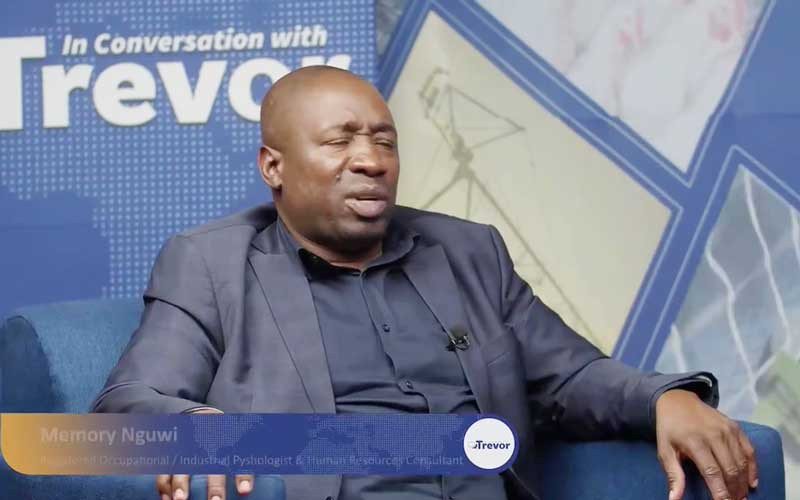
Prominent human resources practitioner Memory Nguwi says there is now science that shows that if an employee has a post graduate degree they will have an added advantage on the job.
Nguwi (MN) spoke to Alpha Media Holdings chairman Trevor Ncube (TN) on the latest episode of In Conversation with Trevor where he discussed various trends in the HR field globally and in Zimbabwe.
Below are excerpts from the interview.
TN: Memory Nguwi, welcome to In Conversation With Trevor.
MN: Thank you very much Trevor.
TN: Memory I thought we would start at an interesting space which is: there is a lot of talk about the new workspace.
Is there anything like that? Is there a new workspace?
What makes it new? How is it different from the workspaces we have had?
- In Conversation with Trevor: Chisamba: Let’s be proud of ourselves
- In Conversation with Trevor: ‘I tried to change Zanu PF from within’ – Margaret Dongo
- In Conversation with Trevor : How car crash changed my life
- In Conversation With Trevor: ‘We lost our humanity’
Keep Reading
MN: I do not think there is anything new.
If you remember when Covid started, we were forced to work from home, it was not a choice.
At that time I think a month after Covid started, we did a research, and we found that people were actually craving to go back to the office because one of the major reasons was loneliness and the home environment is not good for work.
So that was one of the challenges; but also there was one other interesting fact, that managers were not used to supervising people that they could not see, so that presented problems.
Power cuts, people getting stressed and the number of calls that you get from your manager even if you are working from home.
We had these scenarios where people were actually ignoring their managers, they got offended.
So the work from home concept, in actual fact when we go back to research, you will find that the there is no scientific evidence that actually shows that there is an increase in productivity.
TN: I must say my own personal experience was that when it started it felt very interesting, it was novel, it was exciting, but with time I began to miss going away to a different place and coming back home, and I think I am now at a place where actually working from home even when I have a big office or whatever is not going to be an option.
Are you finding a lot of people in that space?
MN: Locally, I think most of the professional firms they have got the infrastructure to work from home, when compared to other jobs.
There are some jobs where you cannot work from home.
TN: Right.
MN: For those that provide professional services, it is easy to switch between home and work, and in some cases you will find that they would say 50% of the time you come to the office, and the other 50% you can operate from home.
If you look at Africa in general, the challenge has been the infrastructure.
TN: Yeah.
MN: Electricity, power cuts and things like that.
TN: So what you are saying is the situation different to let us say America or the UK?
There might be factors that allow people to work from home in those spaces?
MN: Also if you look at the statistics we also notice that those countries, the developed countries, most had already, pre-Covid, they already had a sizeable number of people already working from home, especially those in professional firms.
TN: Right.
MN: Yeah.
TN: There is something new though in the workspace. The prevalence of your millennials and the Gen-Z.
What are you getting from the market in terms of what these two generations are demanding as far as workspace is concerned?
MN: While there is a perception that there is a difference, there is actually a challenge.
If you go back to scientific research, you notice that in terms of actual productivity or work outcomes there is actually no difference between those two.
Proper scientific research; I was actually looking at it as recently as a few weeks ago.
TN: Right.
MN: When we had an argument.
There is actually no significant difference, but people do think that there is a perception that the other generation has got a certain preference than the other one.
One of the challenges is actually to define those generational codes.
Who put the time frame? Okay.
So that is the beginning of the problem in terms of demarcation of research.
Even when you look locally, when people say the the liberators, those who went to war, and the born-free’s, again the demarcation is very difficult to do.
So that is what has affected research and the outcomes that come out of there.
I would really not recommend that you worry too much about that.
TN: Really?
MN: Yeah.
TN: What about the fact that particularly Gen-Z, in terms of their preferences you know?
Technology, being more connected to technology?
They are free spirits that do not want to be controlled and so forth.
At least that is what I'm reading. Is that not a factor that says they ought to be managed differently?
MN: If you go back to research, what they are saying is that this is what people are observing, but when you put it to scientific test those differences are actually blurred. Okay.
We did another research locally where we found no significant difference in terms of benefits that the employees prefer.
Whether they are in this category of generation or the other one, they are the same.
TN: Alright.
MN: That also speaks to support the same conclusion that was done.
This is because the conclusion was not just done by an ordinary research, it was actually a deep meta-analytics study where there is a consolidation of proper top-notch scientific research.
If you go to a website called Science For Work.
TN: Okay.
MN: They actually put that research, where they summarised and actually classified it as not certain that there are those generational differences.
TN: Really? I hold a different view. We had Tashinga Bvekerwa here, a lawyer.
MN: Okay.
TN: She was talking about her own personal experiences as she has come back from the diaspora, she has got a nose ring, she has got dreadlocks.
There is a certain generation, my generation that would look at that person and say you know your dreads ought to go, your nose ring is not for the workspace.
Do we not have that clash of attitudes in the workspace?
MN: What is evident and clear is that dressing evolves, even if you go back to where we started and what we are putting on now.
That is a natural progression.
But 10-20 years from now we could be seeing completely different things in terms of dressing and style.
I can give you an example, I have got one young man who puts on dreadlocks.
When he came for the interviews some people were shocked and they looked at me and they never commented.
TN: Some people were shocked?
MN: Yes.
TN: But you were not shocked?
MN: I was not because I know the science and what science says.
He is actually a very good man in terms of work performance.
TN: But what about that other group of other people that were shocked?
MN: After that we had a discussion, then I said to them, look this is immaterial, it has nothing to do with the actual job performance.
Like many other things that people put emphasis on like gender and many other things.
The science shows that there is no significant relationship.
For example, people ask you when you go for an interview, 'Are you married?'
How many kids do you have?
There is no significance. In actual fact even much more the issue of whether you spend more years in school is actually a very weak correlation in actual job performance. Okay.
Even where you have spent more years in a particular job, when you compare in terms of the correlation between number of years spent in a particular type of job and the actual job performance, the relationship is very weak.
Actually recently there was an article published summarising research that is actually showing now that there is no correlation.
TN: So what is the most important thing?
MN: The most important thing is what is in your brain.
Your ability to think and find solutions to problems, that is key.
TN: And that gets analysed as you do the interviews and the tests?
MN: Yes. The problem that you see is that if you look at Zimbabwe, maybe across the globe, which is something that even this website that I was talking to you about, Science For Work is trying to demystify.
If you want to hire someone now, the first thing that you see is a first degree plus a master’s degree is an advantage.
There is no science that shows that if you have got a master’s degree it is an added advantage in the job. I'm sure you know.
TN: Yeah.
MN: There are people that you have hired ticking all those boxes, but cannot deliver. People do not want to go to science.
There is a very interesting book that you must read.
It is called Denying To The Grave. You must read that book. It is actually presenting facts.
TN: Denying To The Grave?
MN: Yes. It is presenting scientific facts that you cannot dispute, but people still do.
TN: Hahahaha.
MN: So those are some of the the challenges. This is why you find that most companies you will find...
Have you ever heard of a company that was run down by a person with 'O' Level in this country, for example?
TN: No.
MN: They are all master’s, PHD...
TN: Chartered accountants...
MN: So those are the facts, but people do not want to believe that.
TN: Let us talk now about the importance of the HR department?
Jack Welsh in his book Winning says it is important to elevate HR to a position of power and importance in an organisation.
They actually recommend that the HR function should be as near to the CEO as possible.
Is that your view? And in your assessment of the local environment is HR given the recognition that it deserves?
MN: If you look generally Trevor, you will find that most companies that do well, you will see where they are pitching their HR.
It is at the right level, it has the right access to the CEO, it has got the right access to the board.
That is where you see the difference.
Then if you go to some companies that are struggling with industrial relations and even their performance, you will find the the HR role is reporting to someone in finance and admin or operations.
Once you do that you are already showing that there is a problem in the organisation.
We do have quite a significant number of people who have risen from HR position to be CEOs, very good ones actually.
TN: I think one of them being Precious Nyika?
MN: Joe Mutiza. The late Theo Moyo as well.
TN: What is the right level in your view? Is that proximity to the CEO?
MN: It is the proximity. The title to me does not matter. It could be an executive.
TN: But it must report to the CEO?
MN: Do not make that mistake.
Once you get HR to report to somewhere else the problem is you are creating a buffer between the CEO and the people, you are creating a buffer between the CEO and the concerns of your employees.
A finance person will never be able to supervise the HR, I do not think so.
TN: I am sure there are a lot of finance people out there that would disagree with you!
Then in terms of the right person to run the HR department; Jack Welsh says HR types are pastors and parents?
Do you agree with that?
MN: I disagree.
TN: You disagree?
MN: In actual fact if you look now you will find that HR is now moving towards evidence-based management, and there is a big movement around that.
That HR is a science.
We must make our decisions based on scientific evidence. If I am going to recommend Trevor to be in a higher role, what is it that I have seen?
Am I using my own intuition or there is evidence to show that Trevor can actually succeed in a higher role.
So there is a movement going on in terms of evidence-based HR.
While HR people need to be nice, I think first of all they need to be businesspeople, because what you want is HR for business not the HR for HR.
Once you get an HR for HR, you are already in the wrong lane. You want HR for business.
Someone who can come in there and be the sounding board for the CEO on all the issues to do with strategy and HR, because most of the HR people if they are good, they will also be very good on strategy.
- “In Conversation With Trevor” is a weekly show broadcast on YouTube.com//InConversationWithTrevor. The conversations are broadcast to you by Heart and Soul Broadcasting Services









